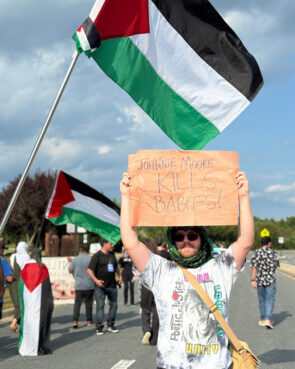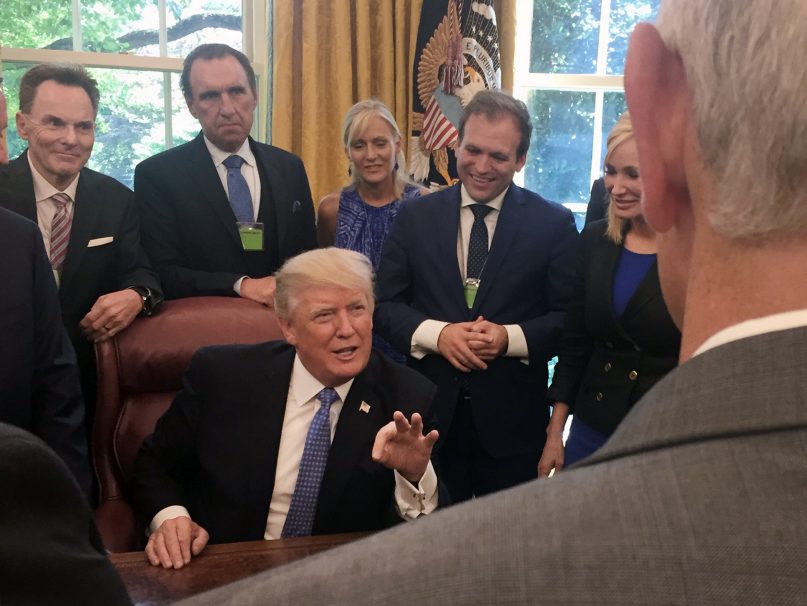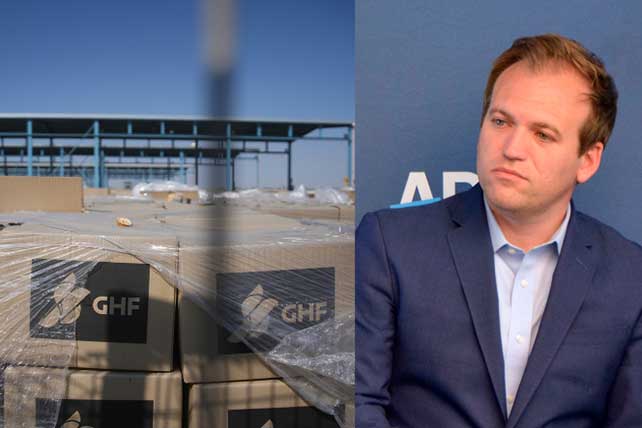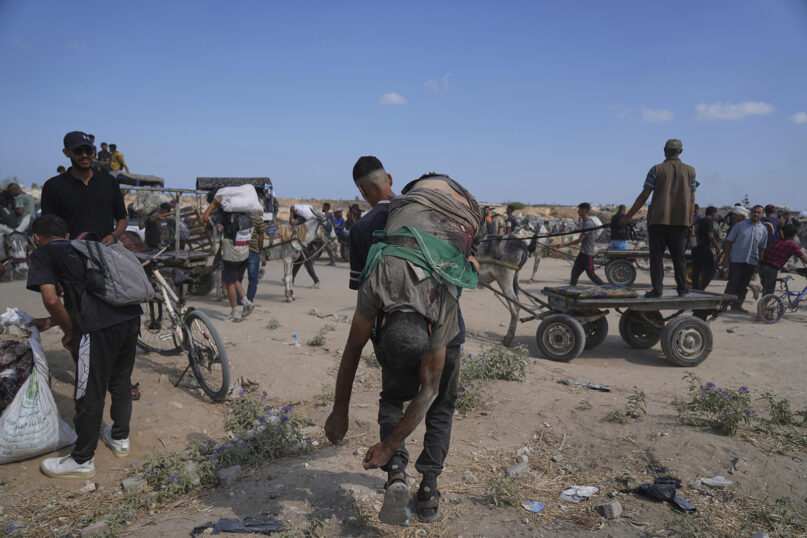(RNS) — Johnnie Moore, the face of the embattled Gaza Humanitarian Foundation, the new nonprofit commissioned to distribute food aid in the war-ravaged Gaza Strip, has long said he believes Christians are called to do great things for God and to help the world become a better place.
So when the U.S. State Department asked him earlier this year to work on a new relief effort for Gaza, according to Moore, the public relations guru and onetime faith adviser to President Donald Trump jumped at the chance.
“I’m a Christian,” Moore, 42, told Religion News Service in an email. “There’s nothing more Christian than feeding people. How could I say no?”
The reasons for anyone to decline are many. In May, as GHF was beginning operations, its executive director Jake Wood, a well-respected aid veteran, stepped down, saying the aid organization’s work could not remain consistent with “humanitarian principles of humanity, neutrality, impartiality, and independence.”
GHF has since become a pariah in the eyes of the United Nations and established humanitarian groups, who accuse GHF of violating humanitarian standards while endangering civilians. Nearly 2,000 Palestinian civilians have been killed seeking food since May, when Israel ended an aid blockade and started allowing the Gaza Humanitarian Foundation, backed by the US and Israel, to start operations.
Of that number, “1,021 were killed in the vicinity of the Gaza Humanitarian Foundation sites and 836 on the routes of supply trucks,” according to a UN report.
A Palestinian carries the body of a man killed while trying to receive aid near a distribution center operated by the U.S.-backed Gaza Humanitarian Foundation in Netzarim, in the Gaza Strip, Aug. 4, 2025. (AP Photo/Abdel Kareem Hana)
Israel has said it has banned the other aid groups and invited GHF in because Hamas was diverting food to its fighters, a claim a U.S. Agency for International Development watchdog has said there is no evidence for.
While the U.S. government and Israeli military have presented no evidence that Hamas has routinely stolen food from aid groups, Israel closed the border to aid vehicles between March and May and continues to make it difficult for aid groups to operate. The U.N.’s World Food Programme has said civilians have been responsible for stopping its trucks before they can reach distribution sites. The U.N. has also said that most of its trucks carrying aid have been intercepted, “Either peacefully by hungry people or forcefully armed actors.” Earlier this month, a U.N.-backed panel declared that famine has taken hold in northern Gaza.
In a scathing report in early August, Doctors Without Borders condemned the GHF program as “orchestrated killing,” rather than the “innovative solution” supporters have called it. More than 100 other aid groups, including CARE and Oxfam, have called for lifting restrictions on other humanitarian aid groups that Israel has imposed.
In an email response, a spokesperson for GHF called the Doctors Without Borders accusations “both false and disgraceful” and alleged the group was repeating a “disinformation campaign orchestrated by the Hamas-linked Gaza Health Ministry.” The spokesperson also sent a list of 200 pro-Israel groups that support GHF.

Palestinian Youth Movement members protest near the Virginia home of Johnnie Moore in August 2025. (Photo courtesy of Palestinian Youth Movement)
While Moore doesn’t oversee aid delivery himself, instead acting as the face of GHF, he has become a subject of intense criticism since taking the job. At a protest near his Virginia home in mid-August, members of the Palestinian Youth Movement waved Palestinian flags and handed out flyers accusing him of being a war criminal. Messages scrawled on the sidewalk read, “Your neighbor is a genocider.” A GHF spokesperson said Moore has been subjected to death threats.
It’s a remarkable turn for Moore, whose career has primarily involved rubbing shoulders with megachurch pastors, pro athletes and politicians. Leveraging his close relationship with the religious right icon Jerry Falwell Sr., Moore launched his public relations firm Kairos Co. in 2015 and has represented the National Religious Broadcasters, the Museum of the Bible and other high-profile clients.
But Moore has also put his religious zeal and his PR savvy in service of political causes, taking on as clients Charlie Kirk’s Turning Point USA and the Rev. Sammy Rodriguez, of the National Hispanic Christian Leadership Conference, as well as associating himself with Trump.
He met Trump, then host of “The Apprentice,” in 2012, when Moore was a vice president and spokesman at Falwell’s Liberty University in Lynchburg, Virginia. The real estate mogul-turned-reality TV star had come to speak at the invitation of Jerry Falwell Jr., who had followed his father as the school’s president. Moore got to know the future president further in 2014, after Moore left Liberty to serve as chief of staff to Mark Burnett, the producer of “The Apprentice” and a rare outspoken Christian in Hollywood.
When Trump began his first run for the White House, Moore played a key part in rallying evangelical support for his candidacy, along with Paula White-Cain, a Pentecostal megachurch pastor and a onetime Kairos client. After Trump won, Moore became the de facto spokesperson for Trump’s informal band of evangelical advisers. When a group of the advisers visited Saudi Arabia in 2018, it was Moore who explained to the press why they had met with Crown Prince Mohammed bin Salman, then under growing suspicion of complicity in the murder of Washington Post journalist Jamal Khashoggi.

FILE – Johnnie Moore, center right, stands with evangelical supporters behind President Donald Trump in the Oval Office at the White House in 2017. (Photo courtesy of Johnnie Moore)
Moore’s support for Trump would be rewarded with an appointment to the U.S. Commission on International Religious Freedom, a bipartisan, independent panel that releases annual reports rating countries’ respect for religious freedom. Moore used the platform to speak out for religious minorities, especially those fleeing the Islamic State group, also known as ISIS, and persecuted Christians in China. Business and advocacy sometimes merged: Kairos later represented, on a pro bono basis, the International Religious Freedom Summit, organized by former Kansas governor and senator Sam Brownback, who had served as Trump’s ambassador for religious freedom. After Moore’s two USCIRF terms ended, he continued his work as an advocate for religious minorities. Ahead of the invasion of Ukraine in 2022, he went to Israel to greet Ukrainian Jewish refugees and spoke about the importance of religious liberty. “Whether in Iraq in 2015, Afghanistan in 2021 or now in Ukraine in 2022, here’s a lesson I have learned: You don’t have to wait for governments to save lives,” he wrote in an RNS commentary that year. “You can do it.”


